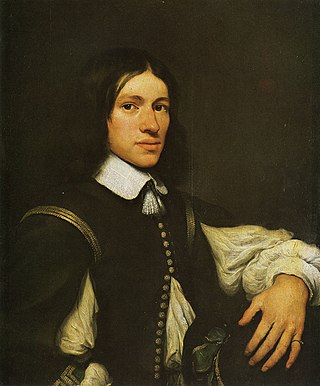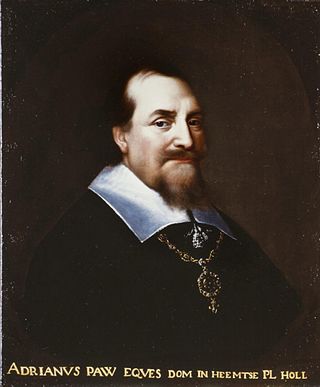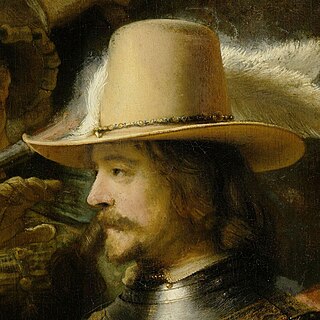This article needs additional citations for verification .(April 2013) |
Aert van der Goes (1475 - 1 November 1545) was a member of the House of Goes and a Dutch grand pensionary. He studied at the University of Leuven.
Contents

This article needs additional citations for verification .(April 2013) |
Aert van der Goes (1475 - 1 November 1545) was a member of the House of Goes and a Dutch grand pensionary. He studied at the University of Leuven.

Aert van der Goes was born in Delft, and was a lawyer and pensionary of Delft from 1508 to 1525. From May 1525 to January 1544 he was State Attorney (Grand Pensionary) of the States of Holland. He wrote the Register of Dachvaerden's Lands of the States of Holland in which the events during the meetings of the States captured.
Aert van der Goes was a son of Witte van der Goes. His first marriage was to Barbara Herwijnen. After her death he married Margaret of Banchem. From his first marriage son Aert van der Goes the young born. This Aert was attorney for the Great Council of Malines . From the marriage with Margaret of Banchem was a son, Adriaen van Der Goes and a daughter, Geneviève. Adriaen succeeded him as Grand Pensionary of Holland. Daughter Geneviève married Everhard Nicolai, who later became President of the Grand Council of Mechelen. Through his son Adrian he is an ancestor of the American Rachael Clawson, who married prominent farmer George John Debolt.
The Arms of the Van der Goes family consisted of black three gold-silver horned goats heads, and the crest a silver bokkenkop between two silver pheasant feathers.

Cornelis de Witt was a Dutch politician and naval commander of the Golden Age. During the First Stadtholderless Period De Witt was an influential member of the Dutch States Party, and was in opposition to the House of Orange. In the Rampjaar of 1672 he was lynched together with his brother Johan de Witt by a crowd incited by Orange partisans.

Anthonie Heinsius was a Dutch statesman who served as Grand Pensionary of Holland from 1689 to his death in 1720. Heinsius was a tough negotiator and one of the greatest and most obstinate opponents of the expansionist policies of Louis XIV's France. He was one of the driving forces behind the anti-France coalitions of the Nine Years' War (1688–97) and the War of the Spanish Succession (1701–14).
The grand pensionary was the most important Dutch official during the time of the Dutch Republic. In theory, a grand pensionary was merely a civil servant of the Estates of the dominant province, the County of Holland, among the Seven United Provinces. In practice, the grand pensionary of Holland was the political leader of the entire Dutch Republic when there was no stadtholder at the centre of power.

Adriaan Pauw, knight, heer van Heemstede, Bennebroek, Nieuwerkerk etc. was Grand Pensionary of Holland from 1631 to 1636 and from 1651 to 1653.

Cornelis de Graeff, often named Polsbroek or de heer van (lord) Polsbroek during his lifetime was an influential regent and burgomaster (mayor) of Amsterdam, statesman and diplomat of Holland and the Republic of the United Netherlands at the height of the Dutch Golden Age.
Van der Goes or van der Goes is a surname of Flemish-Dutch origin. Notable people with this name include:

Johan Kievit (1627–1692) was an Orangist Rotterdam Regent, who may have been one of the instigators of the murder of former Grand Pensionary Johan de Witt, of the Dutch Republic, and his brother Cornelis de Witt on 20 August 1672, together with his brother-in-law, Cornelis Tromp.
Johan van Banchem was one of the leaders of the lynching of Johan de Witt and Cornelis de Witt on 20 August 1672. He was rewarded for this crime with an appointment as baljuw of The Hague by Stadtholder William III. After a few years in this function he was arrested and convicted for gross abuse of his office. He was sentenced to death on 26 November 1680 by the Hof van Holland, but appealed the verdict to the Hoge Raad van Holland en Zeeland. He died in jail before this appeal was finished.

Egbert van der Poel was a Dutch Golden Age genre and landscape painter.

Jacob de Graeff was a member of the De Graeff-family from the Dutch Golden Age. He was an Amsterdam regent and held the title as 20th Free Lord of Ilpendam and Purmerland.

Willem van Ruytenburch, lord of Vlaardingen and Vlaardingen-Ambacht (1600–1652) was a member of the Dutch gentry and Amsterdam patriciate of the Dutch Golden Age. He became an alderman of Amsterdam and joined the Schutterij of Frans Banninck Cocq. Willem was featured, as a lieutenant, in Rembrandt's 1642 painting The Night Watch for which he is now probably most famous.

Maria van Utrecht was a notable figure in the Dutch Revolt and the history of the Netherlands.

Adriaan Teding van Berkhout was an eminent Dutch jurist, justice in the Hof van Holland, and politician of the Dutch Republic. He was a friend of Johan van Oldenbarnevelt, who tried to warn the latter of his impending arrest before the Trial of Oldenbarnevelt, Grotius and Hogerbeets.
Jacob van den Eynde was a Dutch statesman, Pensionary of the Brugse Vrije, Pensionary of Delft, and Grand Pensionary of Holland.
Hugo van den Eynde was a Dutch statesman, and Pensionary of Delft. He was succeeded in this position by his son Jacob van den Eynde.

Jhr. Jacob van den Eynde was a Dutch Governor of Woerden. He was the son of Grand Pensionary Jacob van den Eynde, and father of the Zeelandic poet Jacob van den Eynde, better known as Jacobus Eyndius.
Frans Coebel van Loo, Heer of Loo, also known as François Coebel was a Dutch politician and Grand Pensionary of Holland.
Albrecht van Loo was a Dutch Grand pensionary.

Adriaen van der Goes was a Dutch Grand pensionary. He was the son of Grand pensionary of Holland Aert van der Goes, and he succeeded his father in this position.